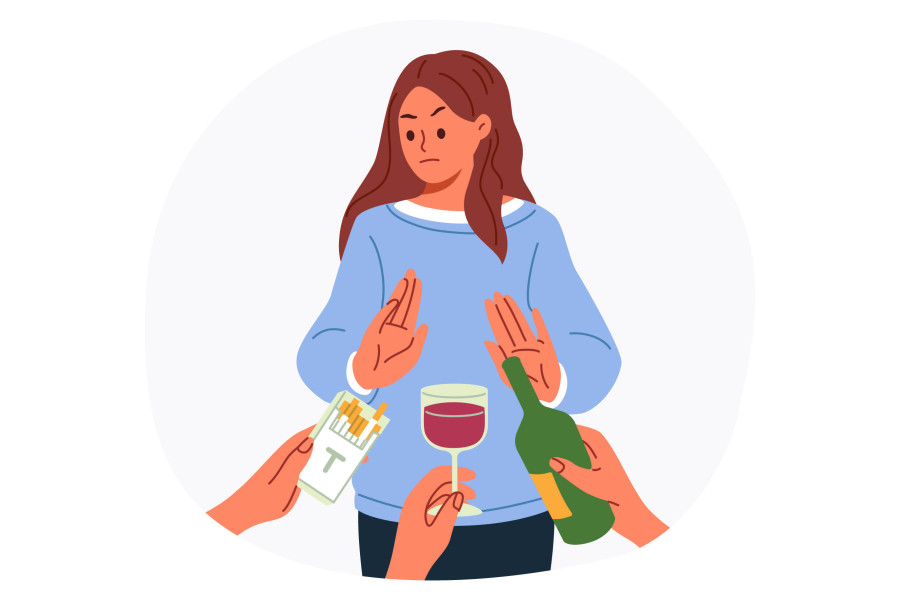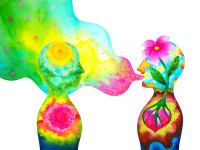Culture & Lifestyle
Why it is difficult to overcome addiction
Addictive substances or behaviours flood the brain with unnaturally high levels of dopamine.
Dipesh Tandukar
When we hear about addiction, our minds often jump to images of individuals dependent on drugs or cigarettes. We tend to associate addiction with those from less privileged backgrounds, picturing someone needing substances just to function. But addiction isn’t confined to drugs alone; it’s far more intricate.
According to the APA, addiction encompasses both psychological and physical dependence on substances like alcohol, as well as activities such as sex, exercise and gambling.
It’s easy to point fingers at those struggling with addiction, assuming they lack willpower or competence. But is it fair to place the blame solely on them? Can we confidently say we would never fall into the same trap? Consider this: addiction isn’t limited to substances. Spending excessive time on social media or constantly checking our phones can also be forms of addiction. Even that daily cup of coffee to kickstart our mornings or the compulsion to always keep busy can signal addictive behaviour.
These habits might seem harmless, like browsing shops without intending to buy or working tirelessly, but they can still be addictive patterns. After all, addiction isn’t just about substances—it’s about any behaviour or activity that hijacks our lives and becomes difficult to control.
The challenge with behaviours like excessive social media use or relying heavily on caffeine or overworking is that they don’t show obvious physical signs. As a result, we often consider them normal, but they can actually have negative effects on our mental, emotional, and physical well-being. Even when individuals realise they’re addicted, breaking the cycle can be incredibly tough. So why is addiction so hard to shake, even when we know it’s harmful?
One major reason is how addiction alters our brain’s reward system. Normally, enjoyable activities like eating good food or spending time with loved ones trigger the release of neurotransmitters like dopamine, which makes us feel pleasure. But addictive substances or behaviours mess with this system, flooding the brain with unnaturally high levels of dopamine.
Over time, the brain gets used to this flood, leading to tolerance—meaning we need more of the substance or behaviour to get the same effect. This artificial boost in dopamine also diminishes the pleasure we get from other everyday activities, making us rely on the addictive substance or behaviour to feel good.
Coupled with this is the cycle of cravings, triggers and relapses that often accompany addiction. Strong urges to engage in addictive behaviour are usually triggered by environmental cues, stress or emotional states. These cravings can be overpowering, and resisting temptation is tough, especially when that behaviour has been our coping mechanism for a long time. Even the most determined among us find it challenging to break free.
The simplest example is cigarettes. Initially, one might provide a sense of euphoria, but as time passes, the number smoked often increases. We've all seen people chain-smoke, finding it increasingly tough to stop. This scenario worsens significantly with hard drugs like heroin or cocaine. Once addicted, breaking free becomes a monumental challenge due to constant urges and relapses.
Yet, we often overlook reliance on substances like caffeine or activities like social media, gambling or exposure to illicit content. These can all become problematic if not kept in check. The crux of the matter is that the consequences of our actions, behaviours and addictions aren’t immediately apparent; they unfold over time. By the time we realise what’s happening, breaking free becomes exceedingly difficult.
Furthermore, addiction frequently intersects with underlying psychological issues such as trauma, anxiety or depression, further complicating matters. Many individuals turn to addictive substances or behaviours to cope with emotional pain or numb uncomfortable feelings. However, these coping mechanisms only serve to perpetuate the cycle of addiction, trapping individuals in a self-destructive pattern.
Breaking free from addiction requires both physical detoxification and psychological healing. We must develop healthier coping mechanisms to replace addictive behaviours. This could mean finding new ways to manage stress, anxiety or emotional pain, such as mindfulness, exercise, or creative activities like art or music.
Building a strong support network is vital in breaking the cycle of addiction. Surrounding ourselves with positive influences, be it supportive friends and family or others in recovery, can offer encouragement and a sense of belonging.
Recovery isn’t a straightforward path; setbacks are inevitable. But every bit of progress, whether it’s eating healthily, learning something new or getting proper sleep, is a victory worth celebrating. Along the journey, it’s important to pause occasionally and acknowledge how far we have come and how much we have improved during the healing process.




 24.62°C Kathmandu
24.62°C Kathmandu





.jpg&w=200&height=120)









